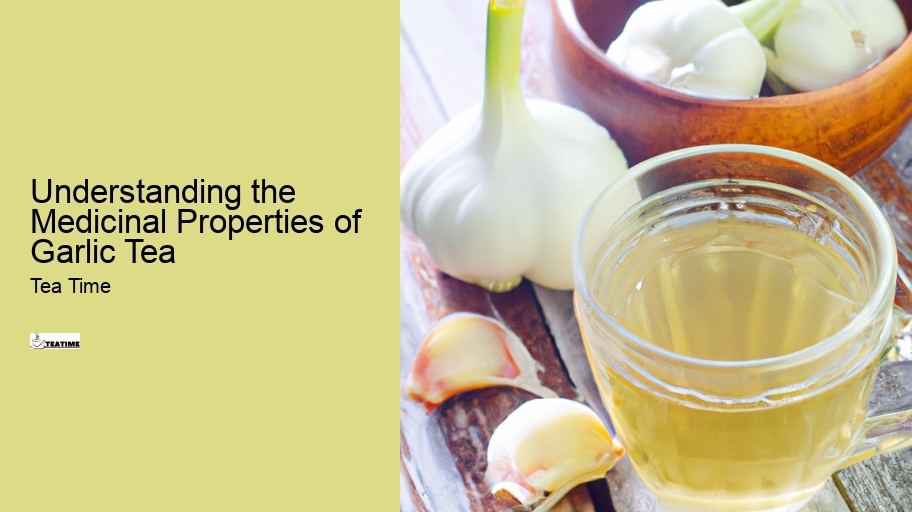

Preparing garlic tea is a straightforward process, allowing anyone to enjoy its health benefits with minimal effort. Start by selecting fresh, organic garlic cloves. Peel and crush them lightly to release the essential oils and active compounds. The number of cloves can be adjusted based on your taste preference and the desired potency of the tea.
Place the crushed garlic in a cup and pour hot water over it. Allow the mixture to steep for about 5 to 10 minutes. The longer it steeps, the stronger and more potent the tea will become. For a smoother taste, you can steep it for a shorter time.
Strain the garlic pieces from the tea, and it's ready to drink. You can enhance the flavor by adding honey, lemon, or ginger. Herbal Infusions These additions not only improve the taste but also complement garlic’s health properties, making the tea a more enjoyable and beneficial drink.
Garlic tea is an effective natural remedy for cold and flu symptoms. Its natural antibacterial and antiviral properties make it a powerful tool in combating these common illnesses.
Consuming garlic tea during cold and flu season can also serve as a preventive measure. It strengthens the immune system, making the body more resistant to viruses and bacteria. The warm liquid of the tea provides soothing relief for sore throats, coughs, and congestion, making it a comforting remedy when feeling under the weather.
To maximize the benefits, it's recommended to drink garlic tea two to three times a day during illness. Adding honey and lemon not only improves the taste but also provides additional soothing and antimicrobial properties. This simple, natural drink can be a valuable addition to your cold and flu care regimen, offering relief and promoting faster recovery.
Storing homemade garlic tea properly is crucial for maintaining its freshness and health benefits. After brewing, if not consumed immediately, garlic tea should be cooled to room temperature. Avoid leaving it at room temperature for extended periods to prevent bacterial growth and loss of potency.
The best way to store garlic tea is in the refrigerator. Use an airtight container to preserve the flavor and prevent absorption of odors from other foods. This method keeps the tea fresh for up to 24 hours. Remember, garlic tea is best enjoyed fresh, so try to consume it within this timeframe.
For reheating, gently warm the tea but avoid boiling. Excessive heat can degrade some of the beneficial compounds in garlic. By following these simple storage and reheating guidelines, you can ensure your garlic tea remains a healthful and enjoyable beverage.
Anti-Bacterial Properties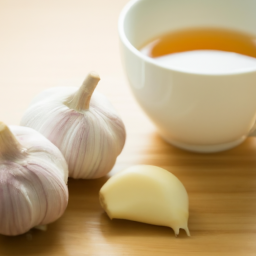
Garlic tea, steeped with the goodness of garlic, offers numerous nutritional benefits. It's a rich source of vitamins and minerals, particularly vitamin C and B6, essential for immune function and energy metabolism. The presence of manganese plays a vital role in bone health and metabolic processes.
The key compound in garlic, allicin, has potent health properties. It's known for its anti-inflammatory, antimicrobial, and antioxidant effects. These qualities contribute to the tea's ability to support heart health, boost immunity, and fight inflammation. Furthermore, garlic tea is naturally low in calories, making it an excellent choice for those monitoring their diet.
Regular consumption of garlic tea can be a simple way to incorporate these nutrients into your daily routine. Its natural composition makes it a healthful addition to any diet, offering a blend of essential nutrients with minimal calorie intake.
Serving garlic tea can be a delightful experience with the right accompaniments. To balance the robust flavor of the tea, consider adding a slice of lemon. The citrus not only adds a refreshing zest but also enhances the absorption of garlic's antioxidants. A spoonful of honey is another excellent addition, offering a natural sweetness and soothing properties.
For those who prefer savory flavors, incorporating herbs like mint or rosemary can add a refreshing twist. These herbs complement the pungent taste of garlic and add their own health benefits. Garlic tea can also be paired with light snacks, like unsalted nuts or crackers, making it a perfect beverage for a relaxing break.
Experimenting with these serving suggestions can elevate your garlic tea experience. Whether you prefer it sweet or savory, there are numerous ways to enjoy this healthful brew, making it a versatile and enjoyable part of your daily routine.
Sustainable Agriculture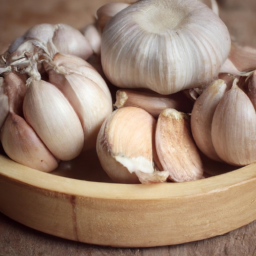
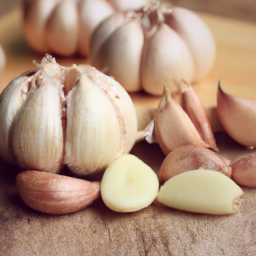
Garlic tea is increasingly recognized for its potential benefits in managing blood pressure. The active compounds in garlic, particularly allicin, are believed to have a positive effect on cardiovascular health. They aid in relaxing blood vessels, which can help in reducing blood pressure levels.
Incorporating garlic tea into a regular diet may provide a natural way to support heart health. Its blood pressure-lowering effects are particularly beneficial for those at risk of hypertension. However, it's important to note that garlic tea should complement, not replace, prescribed medications and a balanced diet.
Consultation with a healthcare professional is essential before using garlic tea as a part of a blood pressure management plan. Gut Health They can provide guidance on how it can fit into your overall health strategy. Home Remedies This ensures that garlic tea is used safely and effectively in conjunction with other treatments.
One of the appealing aspects of garlic tea is its lack of caffeine, making it an excellent choice for those sensitive to stimulants or looking to reduce their caffeine intake. Being naturally caffeine-free, garlic tea can be enjoyed at any time of the day without the risk of disrupting sleep patterns or causing the jittery effects associated with caffeine.
This absence of caffeine also makes garlic tea a suitable option for a wide range of individuals, including those with certain health conditions or dietary restrictions. It allows the enjoyment of a warm, soothing beverage without the concerns that come with caffeine consumption.
For those transitioning from caffeinated drinks, garlic tea can serve as a healthy alternative. It offers the comfort of a hot drink and the health benefits of garlic, all while being gentle on the body and free from the stimulating effects of caffeine.
Brewing Techniques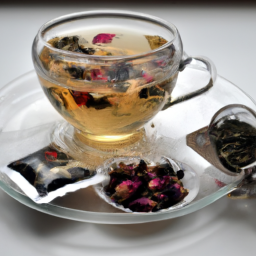
Garlic tea offers a range of health benefits due to its rich content of antioxidants and compounds like allicin. It's known for boosting the immune system, reducing inflammation, aiding in heart health by managing blood pressure and cholesterol levels, and it may also have antibacterial and antiviral properties. Additionally, it can aid in digestion and respiratory health, and some suggest it might help in weight management.
Garlic tea might aid in weight loss as part of a balanced diet and healthy lifestyle. Garlic can boost metabolism and help in regulating appetite, but it should not be relied on as a sole method for weight loss.
While garlic tea is safe for most people, it may not be suitable for everyone. Individuals with garlic allergies, those on blood-thinning medications, or pregnant and breastfeeding women should consult a healthcare professional before consuming garlic tea. Excessive consumption can also lead to digestive discomfort in some people.
Garlic tea is generally well-tolerated, but in some cases, it can cause side effects such as bad breath, body odor, an upset stomach, or heartburn, especially when consumed in large quantities. It's advised to start with a small amount to see how your body reacts.
To make garlic tea, start by peeling and lightly crushing 2-3 cloves of fresh garlic to release their oils. Steep the crushed cloves in a cup of hot water for about 5-10 minutes. Strain the garlic and add lemon or honey to taste, if desired. Adjust the amount of garlic and steeping time according to your taste preference.